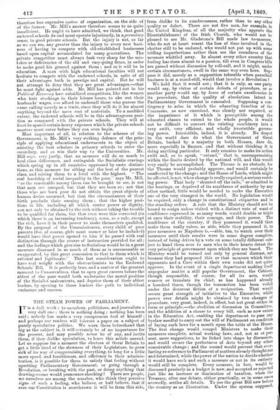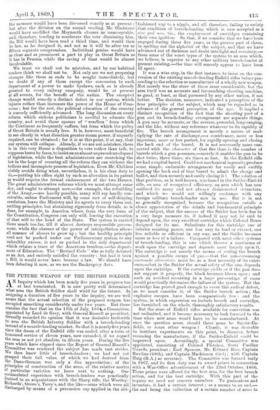THE STEAM POWER OF PARLIAMENT.
IT is a dull week ; to members, politicians, and journalists a very dull one ; there is nothing doing ; nothing has been said ; nobody has made a very conspicuous fool of himself ; and perhaps our readers will tolerate a paper on a subject of purely speculative politics. We warn them beforehand that big as the subject is, it will certainly be of no importance for the present, and may possibly never be of any, and invite them, if they dislike speculation, to leave this article unread. Let us suppose for a moment the electors of Great Britain to get a little tired of the slowness of their Legislature, to grow sick of its way of compromising everything, to long for a little more speed. and forcibleness, and efficiency in their administration, is it possible for them to satisfy that feeling without upsetting Parliamentary Government, or going through a Revolution, or breaking with the past, or doing anything that drawing-rooms would pronounce shocking ? There are people, we ourselves are among the number, who think they perceive signs of such a feeling, who believe, or half believe, that if ever our 'Constitution is overthrown it will be from this side,
from dislike to its cumbrousness, rather than to any other quality or defect. There are not five men, for example, in the United Kingdom, of all the majority who approve the Disestablishment of the Irish Church, who would not be pleased to see Mr. Gladstone's Bill made law to-morrow, who do not at heart resent the loss of time involved in the chatter still to be endured, who would not put up with some trifling imperfections rather than see the roundness of the measure whittled away. In almost every other country that feeling has risen almost to a passion, till even in Congress bills are passed without discussion by roll-call, and it might, under certain circumstances, swell in the same way even here. Suppose it did, merely as a supposition tolerable when parochial business is at a stand-still, would that involve a Revolution ?
We hold that it would not ; that it is only, as one party would say, by virtue of certain defects of procedure, or as another party would say, by force of certain excellencies in its procedure, that the quality of absolutism latent in Parliamentary Government is concealed. Supposing a con. tingency to arise in which the educating function of the Commons, as now exercised, was clearly not required, or the impatience of it which is perceptible among the educated classes to extend to the whole people, it would not be difficult to convert the existing machinery into a very swift, very efficient, and wholly irresistible governing power. Irresistible, indeed, it is already. No despot in the world dare do what the Government of Great Britain, backed by a majority in both Houses, dare do, more especially in finance, and that without thinking it is doing anything particular. It only remains to make its action swift and, so to speak, "rotund," that is, uncompromising within the limits desired by the national will, and this would very easily be accomplished. The Throne is no obstacle, for the Throne would probably approve, and would certainly be unaffected by the change; and the House of Lords, which might be affected, is not, when change is really required, a serious resisting power. That body "shunted off the rails," or admitted to the hustings, or deprived of its semblance of authority by any other method, little would be needed to make the Executive one of the very strongest in the world. No legislation would be required, only a change in constitutional etiquettes and in the standing orders. A rule that the Ministry should not be bound to resign unless visited with a distinct vote of want of confidence expressed in so many words, would double or triple at once their stability, their courage, and their power. The confidence of the country, if they possessed it, would then make them really rulers, as able, while they possessed it, to pass measures as Napoleon is,—able, too, to watch over their measures until their results were in some degree complete, instead of being driven by a vote on some totally different subject to hand them over to men who in their hearts detest the very principle of government upon which they are based. The Ministry would be turned out only by general distrust, not because they had proposed this or that measure which their opponents and a Cave within their own ranks did not quite approve. In the event of a single department making itself unpopular amidst a still popular Government, the Cabinet, though responsible, of course, for all its acts, would remove or translate its chief, as has happened already a hundred times, though the transaction has been veiled under the decorous fiction of a resignation. That would secure great strength of initiative to the Executive, while power over details might be obtained by two changes of procedure, very great, indeed, in effect, but not great either in form or principle,—the abolition of discussion in Committee, and the addition of a clause to every bill, such as now exists in the Education Act, enabling the department to pass any byelaw needful to carry out the will of Parliament on condition of laying such laws for a month upon the table of the House. The first change would compel Ministers to make their measures complete, actual working laws, and, not as at present, mere suggestions, to be licked into shape by discussion, and would secure the perfectness of Acts beyond any other conceivable change ; and the second would prevent that everlasting re-reference to Parliament of matters already thought out and determined, while the power of the nation to decide whether it would have such and such a measure or not in its entirety would still be complete. Every measure, in fact, would be discussed precisely as a budget is now, and accepted or rejected just like an increase or diminution of taxation, when the Treasury, after one debate, either practically, or in some cases avowedly, settles all details. To use the great Bill now before the country as an illustration. Under the system supposed, the measure would have been discussed exactly as at present ; but after the division on the second reading, Mr. Gladstone would have modified the Maynooth clauses as unacceptable, and, therefore, tending to accelerate the vote dismissing him, the Bill would have been read a third time, and would then be law, as he designed it, and not as it will be after ten or fifteen separate compromises. Individual genius would have as clear and as prominent a part to play in Great Britain as it has in Prussia, while the saving of time would be almost incalculable.
We trust we shall not be mistaken, and by our habitual readers think we shall not be. Not only are we not proposing changes like these as ends to be sought immediately, but we doubt if any of them except the concession to each department of a power to make byelaws, such as is already ranted to every railway company, would be, at present at all events, for the benefit of the nation. The excepted change would remedy a distinct defect in our system, which injures rather than increases the power of the House of Commons; but for the rest, the political education of the country is scarcely sufficiently advanced. The long discussion on every reform which sickens politicians is needful to educate the country, and avoid those spasms of " reaction " from which the Continent so frequently suffers, but from which the policy of Great Britain is usually free. It is, however, most beneficial to see clearly in what direction greater steam power, if urgently required, can be obtained ; for it is at this point, if at any, that our system will collapse. Already, if we are not mistaken, there is in this very House a disposition to vote rather than talk, to suppress bores by force, to insist on an almost unprecedented speed of legislation, while the best administrators are stretching the law in the hope of securing all the reform they can without the tedious and incomplete process of legislation. Even Mr. Childers risibly avoids doing what, nevertheless, it is his clear duty to do,—putting his office right by such an alteration in its patent as would require the formal endorsement of the two Houses. The great administrative reforms which we must attempt some day, and ought to attempt now,—for example, the rebuilding of the Army,—are hardly possible, many will say hardly conceivable, unless Parliament will, by some sort of self-denying resolution, leave the Ministry and its agents to carry them out, settling principles, but abstaining rigorously from details, as is done, for example, in America, where, from the very form of the Constitution, Congress can only will, leaving the execution of that will to the head of the State. The system is carried there much too far, till it almost destroys responsible government, while the absence of the power of interpellation allows all manner of abuses to grow up ; but the healthy principle need not be pushed under our Parliamentary system to any unhealthy excess, is not so pushed in the only department which retains a trace of the American freedom,—the department of Education. The "Revised Code" Was as fully debated as an Act, and entirely satisfied the country ; but had it been a Bill, it would never have become a law. We should have been debating it now, as we are the Bankruptcy Acts.



































 Previous page
Previous page